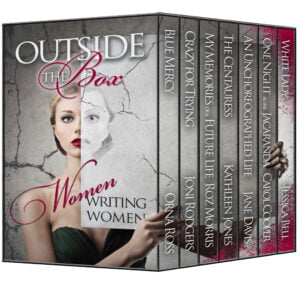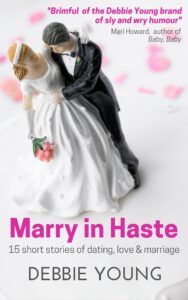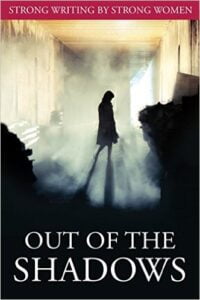Many indie authors like to expand their portfolio with compilations of short or long pieces, on their own or in collaboration with other authors. Sometimes they struggle to know what exactly to call such a product, and I've often seen collections labelled as anthologies or vice versa.
So here's the low-down on the differences between these three popular and useful formats, to help you classify your products correctly,with tips on how to use them to best effect to cross-sell your whole list.
Definitions
- A collection is a set of short pieces by a single author
- An anthology is a volume of short pieces by a number of different authors
- A box set is a bundle of of full-length books by either a single or different authors.
Collections
A collection is a great way to bring together in one place short pieces, whether or not they've been previously published. If you have short stories that have been previously published in magazines or online, “repurposing content” is the buzzphrase for this approach.
Provided that the magazine has bought only the right to be the first to print the piece, which is standard practice, the copyright remains with you. You're free to publish it elsewhere anywhere you like, but it's courteous to both the original publisher and your readers, and sometimes the publisher's stipulated requirement, that should you republish it elsewhere, you include a statement citing where it first appeared.
A collection with a specific theme provides a more consistent experience for the reader, e.g. my most recent collection, Marry in Haste, has a theme of dating, love and marriage, and there are three distinct sections with five stories on each of these topics. Random stories on various topics, bolted together willy-nilly, can feel a bit like watching a movie made from offcuts on the cutting room floor, although readers may also enjoy the element of surprise, like Forrest Gump's box of chocolates analogy. (“Mama always said life is like a box of chocolates. You never know what you're gonna get.”)
Marketing Advantage: Although not hugely commercial, because lots of people are averse to short stories (sigh!), a collection can offer a satisfying quick read for those don't want a long, complicated book, are pressed for time, or want to sample your style before committing to your novels.
Anthologies
Anthologies usually have a theme of some kind, whether of length (eg National Flash Fiction Day's 2016 anthology, A Box of Stars Beneath the Bed, includes 500-word stories of all kinds) or theme (eg Out of the Shadows provides stories by ALLi member women writers with female characters at their core).
Marketing Advantage: anthologies provide a great opportunity for authors to cross-sell to each other's fans, presuming that each contributor has a different audience to which they actively promote the book. Having a story featured in an anthology is also a great way to add a new book to your portfolio without actually having to write a whole one yourself. If even just one of your stories has been included in a multi-author anthology, you can claim it for your Amazon author page via Author Central, which adds to your credibility as an author. This is especially useful early in your self-publishing career when you have just one or two books out.
Box Sets

This collaborative literary fiction box set brought together seven literary fiction authors from around the world
A box set is a group of full-length books sold together, usually at a price that offers considerable savings compared to buying each of the books individually. A box set may be either by a single author, typically combining a whole series of books in a bundle, similar to box sets of TV shows on Netflix, or by multiple authors.
Outside the Box (left) was a notable box set of literary fiction novels published last year by ALLi author members Orna Ross, Jessica Bell, Kathleen Jones, Carol Cooper, Jane Davis, Roz Morris, and Joni Rodgers.
The box set offers more flexibility and scope than an anthology because it's essentially a cosmetic job to provide a virtual outer wrapper for existing products, whereas an anthology has to compiled, edited and formatted afresh, creating a single new book. Unlike collections and anthologies, which are usually print and book, box sets are usually ebook only, rather than in print, which means production is cheap, easy and low-risk. You can publish (and unpublish) box sets relatively rapidly, experiment by offering different box sets on different platforms, or offer them for fixed time periods to encourage take-up on a “when it's gone, it's gone” principle.
Marketing Advantage: Single author box sets can persuade readers to buy a whole series in one go, rather than working slowly through it (and maybe getting distracted before they've bought them all). Multiple author box sets allow authors to cross-sell to each other's audiences, in the same way as anthologies. If you're prepared to get the right mix, do a lot of planning, and invest in coordinated marketing, you can get a lot of mileage from a box set, e.g. the twelve-book crime set, Deadly Dozen, featuring books by ALLi authors Diane Capri and J F (Joanna Penn), hit the New York Times and USA today bestseller lists.
While collections, anthologies and box sets may or may not make you a handsome profit, they are definitely a useful addition to any writer's portfolio, and collaborating with other authors can be fun too – although for the sake of satisfaction all round, it's best to agree in advance how you will share responsibilities (and profits), before you press the publish button.
OVER TO YOU If you have a success story or a cautionary tale on this topic, we'd love to hear about it!
RELATED POSTS
- How to reach readers with boxed sets – by Diane Capri
- How and why to set up an Amazon author page – by Mark Gillespie









Where is the best place to publish box sets as Lulu, Createspace and KDP don’t offer this as an option. Thanks
Box set or boxed set? I have heard both terms used … and what about an omnibus–has it gone out of fashion?
Super article, Debbie! This should certainly clear the air with this topic.
On another note: is it against policy on this website to share the links of outstanding posts? I believe many authors would find much value in these gems.
Hi Blaze, thanks for your kind feedback. Please do feel free to share links to any posts on this website with anyone you like – all shares will be much appreciated! We are keen to spread the word and help as many authors as possible.
Thank you! I certainly will.
Very useful Debbie, and timely for me, as I was working on what I thought was an anthology of pieces from a newspaper series (all written by me) and now realise it’s a collection. Thank you!
I’m glad about that, Celine – good luck with your new collection! 🙂
For your readers who use the U.S. Copyright Office to protect their work, I offer this practice tip when applying for a copyright registration on a collection: a single application can be used for a collection of previously unpublished works. If the works in the collection are a mix of unpublished and previously published works, multiple applications need to be filed to protect the collection. In order to file an application for a collection of previously published works, they must have been published in the same day in the same unit of publication.
The CO’s instructions on how to protect a collection can be confusing but they should not prevent a self-published author from taking advantage of the protections a copyright registration has to offer.
Gosh, that sounds complicated! Thanks for that helpful information, Kathryn. I am UK based and we don’t have an equivalent to the US Copyright Office here, which makes life simpler! Thank you for adding this valuable advice.
Very useful post, Debbie!
What’s your view on “anthology” as a collection of works by the same author? I’ve seen some authors reserve the term exclusively for multi-author collections, while others use it for a collection of their own works.
The dictionary is happy with either usage, but doesn’t offer any clues about the pitfalls of using one over the other.
Thanks, John, glad you found it helpful.
I too have seen lots of authors calling a collection of their own work an anthology, but IMHO that wrong-foots the reader who might be expecting a book by multiple authors.
I think you would be on safer ground putting “collection” in the title of a multiple-author work, because it’s a broader term, really just meaning “a whole bunch of stuff”. Anthology is a harder/less common word, which might be one reason for avoiding it, depending on your audience.
Plus of course one can sidestep the issue by calling your collection or anthology something entirely different – “A Treasury” is quite common for children’s stories and poetry, and SilverWood Books has published an anthology of their authors’ work under the title “Selection Box” (not sure if you have selection boxes in the US, but here they’re a popular format for confectionery, like a box of chocolates, especially popular at Christmas). I notice in their blurb in their online shop they’ve called it a collection rather than an anthology! Here’s the link if you’d care to check it out: http://www.silverwoodbooks.co.uk/product/9781781323885/silverwood-selection-box
Ultimately as indies we can call books whatever we like. The point of my piece really, I suppose, is to draw attention to the possibilities and to help people choose what would create the right expectations in the reader – and be less likely to trigger disgruntled reviews on Amazon. Though you will always get those from people who buy without reading the blurb first – e.g. “This book of short stories is full of short stories and I only like so I’m giving it one star.” I haven’t had a review quite that extreme yet but I have seen them left against other people’s books!